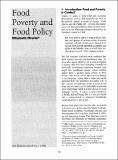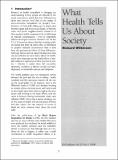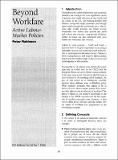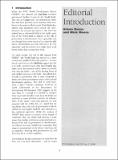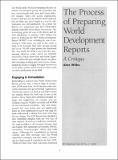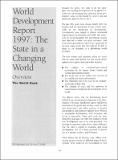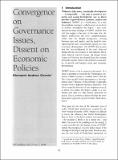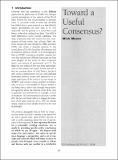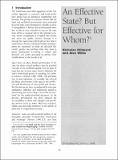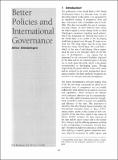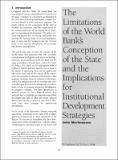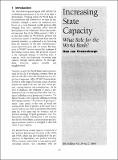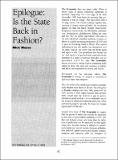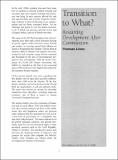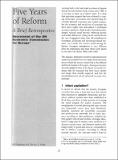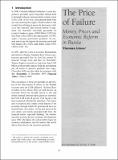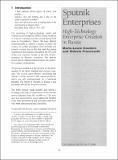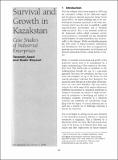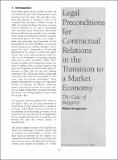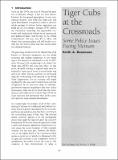Volumes 21 - 30: Getting Institutions Right for Women in Development: Recent submissions
Now showing items 361-380 of 444
-
Food Poverty and Food Policy
(Institute of Development Studies, 01/01/1998)Summary Until recently the consequences of poverty for food, and the food element in social exclusion, have been sidelined in post?war Britain, both by those working on food and nutrition and by those in social policy. ... -
What Health Tells Us About Society
(Institute of Development Studies, 01/01/1998)Summary Richard Wilkinson summarises the argument of his recent book Unhealthy Societies: The Afflictions of Inequality (Routledge, 1996). Social class differences in health show how sensitive health remains to the social ... -
Beyond Workfare: Active Labour?Market Policies
(Institute of Development Studies, 01/01/1998)Summary Approaches to labour?market policy and to workfare are conditioned by different perspectives on the causes of and prospects for unemployment and social exclusion. There appears to be a high level of correlation ... -
Editorial Introduction
(Institute of Development Studies, 01/04/1998) -
The Process of Preparing World Development Reports: A Critique
(Institute of Development Studies, 01/04/1998) -
World Development Report 1997: The State in a Changing World: Overview
(Institute of Development Studies, 01/04/1998) -
Convergence on Governance Issues, Dissent on Economic Policies
(Institute of Development Studies, 01/04/1998)Summary WDR97 is an attempt to reconcile the ‘Washington consensus’ with the ‘East Asian model’. It underscores the complementarity existing between state and market, the need to reinvigorate the state's institutions, and ... -
Toward a Useful Consensus?
(Institute of Development Studies, 01/04/1998)Summary WDR97 provides the basis for creating a reasonable working consensus about the role of government in development. It achieves this not by providing specific policy conclusions on which we can all agree – the Report ... -
An Effective State? But Effective for Whom?
(Institute of Development Studies, 01/04/1998)Summary Neoliberal rhetoric has urged the reduction of the state's role, but in many ways state power and spending have merely been redirected rather than reduced. WDR97 urges states to become effective, but does not say ... -
Better Policies and International Governance
(Institute of Development Studies, 01/04/1998)Summary The World Development Report represents a welcome change from the World Bank's previous conceptions of the state and development. It is more nuanced, and recognises the intimate relationships between economics and ... -
The Limitations of the World Bank's Conception of the State and the Implications for Institutional Development Strategies
(Institute of Development Studies, 01/04/1998)Summary WDR97 has reinstated firmly on the international agenda the role of the state in development ? not with notions of the state as the chief engine of growth, but with notions of the state as a set of institutions ... -
Increasing State Capacity: What Role for the World Bank
(Institute of Development Studies, 01/04/1998)Summary The World Development Report 1997 provides a refreshing perspective on the state in developing countries. It suggests a strategy to increase state effectiveness by matching roles to capacity while also increasing ... -
Epilogue: Is the State Back in Fashion?
(Institute of Development Studies, 01/04/1998) -
Transition to What?
(Institute of Development Studies, 01/07/1998)Summaries This article examines the development of monetary policy in Russia since prices were liberalised in 1992. It traces events from the monetary overhang which preceded that step, through sharp inflation and the ... -
Five Years of Reform:
(Institute of Development Studies, 01/07/1998)Summaries This article examines the development of monetary policy in Russia since prices were liberalised in 1992. It traces events from the monetary overhang which preceded that step, through sharp inflation and the ... -
The Price of Failure:
(Institute of Development Studies, 01/07/1998)Summaries This article examines the development of monetary policy in Russia since prices were liberalised in 1992. It traces events from the monetary overhang which preceded that step, through sharp inflation and the ... -
Sputnik Enterprises:
(Institute of Development Studies, 01/07/1998)Summaries Russian scientific and technical capacities under socialism were mainly concentrated in academic research institutes. Their human and incorporated assets are now threatened by two factors: lack of resources, ... -
Survival and Growth in Kazakstan:
(Institute of Development Studies, 01/07/1998)Summaries This article assesses the recent developments in the enterprise sector in Kazakstan by analysing two enterprises there: one enterprise set up during the Soviet era and recently privatised, and a new enterprise ... -
Legal Preconditions for Contractual Relations in the Transition to a Market Economy:
(Institute of Development Studies, 01/07/1998)Summaries This article examines the process of transformation of the legal framework of contractual relationships in transition economies by looking at the case of Bulgaria in the period 1990–97. The aim is to throw light ... -
Tiger Cubs at the Crossroads:
(Institute of Development Studies, 01/07/1998)Summaries Since the 1970s, Vietnam has been moving from a centrally planned to an open economy on a step?by?step basis. A premium is now being accorded by national policymakers to a new national science and technology ...

